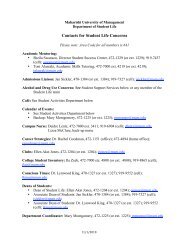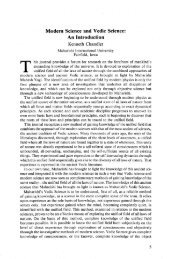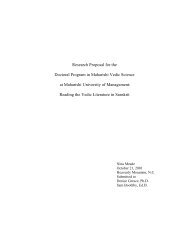Success in Government - Maharishi University of Management
Success in Government - Maharishi University of Management
Success in Government - Maharishi University of Management
Create successful ePaper yourself
Turn your PDF publications into a flip-book with our unique Google optimized e-Paper software.
MODERN SCIENCE AND VEDIC SCIENCE<br />
were unarguable.<br />
The preoccupation with economic policy leads to endless debate nationally and <strong>in</strong>ternationally<br />
about particular economic schools <strong>of</strong> thought. Neo-Keynesians vie with neoclassicists,<br />
proponents <strong>of</strong> <strong>in</strong>terventionism with free market theorists. Economic gurus<br />
move <strong>in</strong> and out <strong>of</strong> fashion. When one chosen approach to economic management fails<br />
to deliver satisfaction, an alternative approach is embraced, <strong>of</strong>ten with a messianic fervor<br />
about the splendid outcomes that it will allegedly deliver. Economic debate <strong>in</strong> the<br />
20th century, with its <strong>in</strong>tensity and <strong>in</strong>tolerance, is not dissimilar to the acrimonious religious<br />
tractarianism <strong>of</strong> 16th and 17th century Europe.<br />
Politicians caught up <strong>in</strong> the economic policy arguments <strong>of</strong>ten look for exemplars<br />
among other countries to argue that they represent models which their own country<br />
should be follow<strong>in</strong>g. The economic grass seems to look greener on the other side <strong>of</strong> the<br />
fence. The media, the <strong>in</strong>ternational literature and argumentation from parliamentary<br />
debat<strong>in</strong>g chambers and university cloisters to buses and bars all go round and round <strong>in</strong><br />
the search <strong>of</strong> optimal direction.<br />
It does not seem to occur to the political and other constituencies <strong>in</strong>volved <strong>in</strong> this tortured<br />
exercise that their basic premise may be wrong. Given their repeated failure to<br />
f<strong>in</strong>d fulfillment through economic prescriptions, one can admire, after a fashion, their<br />
persistence <strong>in</strong> cont<strong>in</strong>u<strong>in</strong>g to worship this clay-footed god, but not their rationality. When<br />
constant endeavor down a particular path <strong>of</strong> action is <strong>in</strong>variably unsuccessful, it suggests<br />
rather pla<strong>in</strong>ly that the approach <strong>in</strong> question is not efficacious.<br />
There are many who challenge the centrality <strong>of</strong> economic policy and they tend to<br />
come from the political left. These are generally people who f<strong>in</strong>d unacceptable the<br />
human cost that so <strong>of</strong>ten seems to be associated with economic change. S<strong>in</strong>ce the world<br />
sharemarket crash <strong>in</strong> 1987, both governments and bus<strong>in</strong>ess <strong>in</strong> many countries have had<br />
to make pa<strong>in</strong>ful adjustments to deal with the consequences <strong>of</strong> over-borrow<strong>in</strong>g prior to<br />
the crash. The suffer<strong>in</strong>g <strong>in</strong>duced by this has been reflected <strong>in</strong> high unemployment levels<br />
and stagnant or decl<strong>in</strong><strong>in</strong>g real <strong>in</strong>comes.<br />
Much <strong>of</strong> the reaction aga<strong>in</strong>st this pa<strong>in</strong> has been expressed <strong>in</strong> a challenge to the primacy<br />
<strong>of</strong> economic agencies with<strong>in</strong> governments. In countries such as Australia and<br />
New Zealand, where economic egalitarianism has been someth<strong>in</strong>g <strong>of</strong> a tradition, there<br />
has been concern that economic policy management has resulted <strong>in</strong> a widen<strong>in</strong>g <strong>of</strong> the<br />
gap between the rich and the poor. Societies are becom<strong>in</strong>g <strong>in</strong>creas<strong>in</strong>gly worried about<br />
the polarization <strong>of</strong> “haves” and “have-nots.”<br />
Economic policy is seen as requir<strong>in</strong>g trade-<strong>of</strong>fs. For every benefit economic policy<br />
seeks to deliver there is a cost to be paid <strong>in</strong> some other area—<strong>of</strong>ten <strong>in</strong> social policy. This<br />
understandably arouses dissatisfaction and, at times, strong hostility. The conventional<br />
approach to government around cab<strong>in</strong>et tables and with<strong>in</strong> parliamentary caucuses is to<br />
horse-trade priorities. Political factors tend to determ<strong>in</strong>e how resources are allocated. It is<br />
a system which is almost guaranteed to produce widespread dissatisfaction because it is<br />
not based on objective rationality or equity. For every w<strong>in</strong>ner, there is a loser.<br />
The conventional view, shared by almost all political parties, is that this k<strong>in</strong>d <strong>of</strong><br />
trade-<strong>of</strong>f is unavoidable. It is seen to be ak<strong>in</strong> to an economic law. Economics is all<br />
about mak<strong>in</strong>g decisions on the allocation <strong>of</strong> scarce resources and, almost by def<strong>in</strong>ition,<br />
160

















